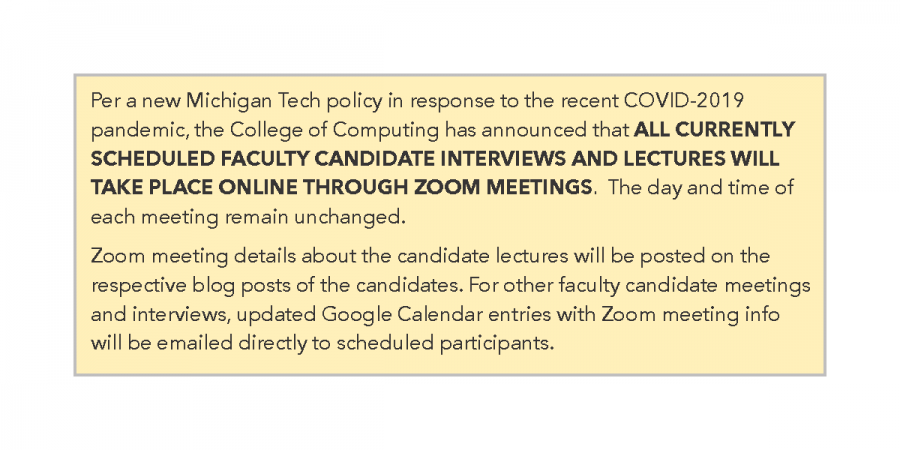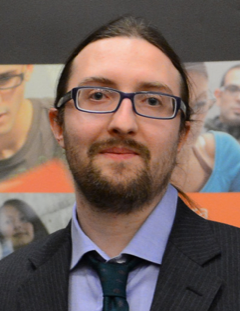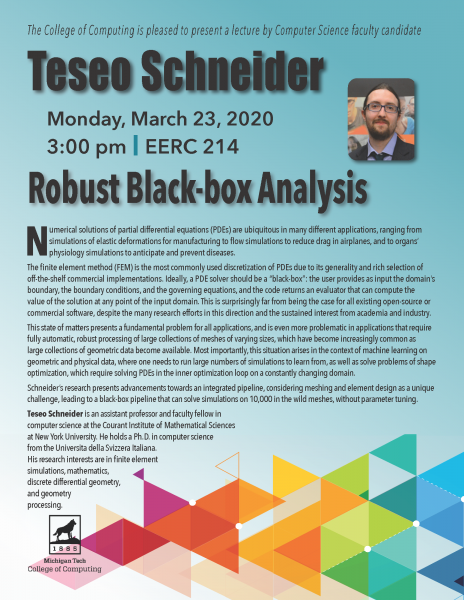

The College of Computing invites the campus community to a lecture by faculty candidate Teseo Schneider on Monday, March 23, 2020, at 3:00 p.m. The title of Schneider’s lecture is, “Robust Black-box Analysis.”
Link to the online Zoom meeting here.
Schneider is an assistant professor and faculty fellow in computer science at the Courant Institute of Mathematical Sciences at New York University. He holds a Ph.D. in computer science from the Universita della Svizzera Italiana (2017). His research interests are in finite element simulations, mathematics, discrete differential geometry, and geometry processing.
Numerical solutions of partial differential equations (PDEs) are ubiquitous in many different applications, ranging from simulations of elastic deformations for manufacturing to flow simulations to reduce drag in airplanes, and to organs’ physiology simulations to anticipate and prevent diseases.
The finite element method (FEM) is the most commonly used discretization of PDEs due to its generality and rich selection of off-the-shelf commercial implementations. Ideally, a PDE solver should be a “black-box”: the user provides as input the domain’s boundary, the boundary conditions, and the governing equations, and the code returns an evaluator that can compute the value of the solution at any point of the input domain. This is surprisingly far from being the case for all existing open-source or commercial software, despite the many research efforts in this direction and the sustained interest from academia and industry.
To a large extent, this issues from treating meshing (and geometry more in general) and FEM basis construction as two disjoint problems. The FEM basis construction may make a seemingly innocuous assumption (e.g., on the geometry of elements), leading to exceedingly difficult requirements for meshing software.
This state of matters presents a fundamental problem for all applications, and is even more problematic in applications that require fully automatic, robust processing of large collections of meshes of varying sizes, which have become increasingly common as large collections of geometric data become available. Most importantly, this situation arises in the context of machine learning on geometric and physical data, where one needs to run large numbers of simulations to learn from, as well as solve problems of shape optimization, which require solving PDEs in the inner optimization loop on a constantly changing domain.
Schneider’s research presents recent advancements towards an integrated pipeline, considering meshing and element design as a unique challenge, leading thus to a black-box pipeline that can solve simulations on 10,000 in the wild meshes, without any parameter tuning.
Schneider earned a Postdoc.Mobility fellowship from the Swiss National Science Foundation (SNSF) to pursue his research aiming to bridge physical simulations and geometry.Teseo is also the main developer of Polyfem (https://polyfem.github.io/), a flexible and easy to use Finite Element Library. He is one of the maintainers of libigl (https://github.com/libigl/libigl), and a contributor to wild meshing (https://github.com/wildmeshing), a 2D and 3D robust meshing library.
